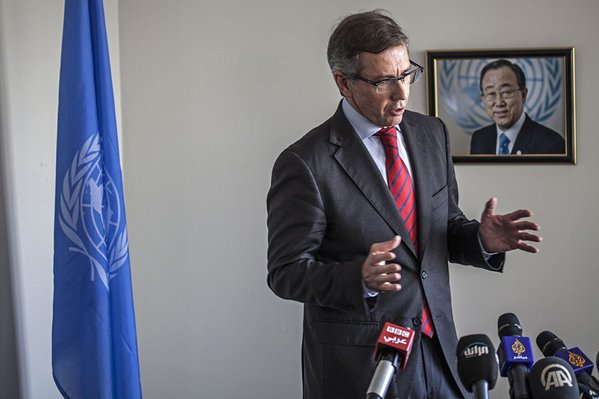Bernardino Leon in the United Arab Emirates… A curious mix of genres?

(B2) The UN special envoy for Libya, the Spaniard Bernardino Leòn, left office on Friday. He is expected to take the post of head of the diplomatic academy of the United Arab Emirates. An institute responsible for training Arab diplomats and promoting the foreign policy of Abu Dhabi and the other emirates of the federation.
A decision that dates back to last June
We cannot therefore say that the Spaniard will have lost a lot of time or left a “sanitary” interval between these two functions. The decision would have been made last June, reveals The Guardian which gives many details about the transaction. Bernardino Leon would receive a salary of £35.000 (approx. $50.000) per month on the spot. Difficult to refuse... To this must be added a housing allowance of 360.000 Dirhams (£63.000). A little too fair according to Leon who wanted the double.
A curious mix of genres
In the negotiation, the Spaniard argued his competence in the Emiratis, boasting in an email sent in August of also being in line for a prestigious post at the UN: “ a sort of high adviser for all UN mediations ". Which would help the future diplomats of the Emirates to dialogue with the most eminent mediators in the world ". But " of course, if you prefer that I focus exclusively on [the Diplomatic Academy], that's fine and I'm not going to accept (this) proposal he adds. We are very close to the mixture of genres...
A strategy to delegitimize the GNC?
But there would be worse, if we are to believe the British daily. Another email was sent in December 2014, to the Minister of Foreign Affairs of the Emirates, Sheikh Abdullah bin Zayed, from the personal account of Bernardino Leon where he describes his strategy. He clearly states, not working on a political plan that will include everyone but rather a strategy aimed at " completely delegitimize » GNC (General National Congress, Tripoli). He also admits that " all my moves and proposals were consulted (and in many cases, designed) by the HOR (the House of Representatives in Torbouk), Aref Nayed (the Libyan ambassador to the United Arab Emirates) and Mahmoud Jibril (the former Libyan Prime Minister who resides in the Emirates) ».
The option of a peace conference
In this electronic letter exchange, Bernardino Leon also describes his difficulties and his fears. " Due to the slow progress of the peace talks, Europe and the United States were asking for a "plan B (in the form of) a classic peace conference... This is, in my opinion, an option worse than a political dialogue...because it will treat both sides as equal players ».
I remained impartial defends Bernardino Leon
How to maintain a certain impartiality in the negotiations in Libya when one knows that one is employed by a State which supports one of the parties to the negotiation? Bernardino denies this in an email addressed to the editorial staff of the British daily. He denies any conflict of interest. " The only defense against these attacks is my job. (...) Read my proposals, the agreement and the government's proposal. This is considered by Libyans on both sides to be a fair proposition »
“The only defense I have against these attacks is my work. As I said before, read my proposals, the agreement and the government proposal. It has been considered by the Libyans from both camps as a fair proposal.
Another job earlier
The UN special envoy actually wanted to quit last January, taking an “academic post in America. " It was only several months later, when my UN contract was about to expire, that I again started discussing my future job. "He assures.
Comment: this practice nevertheless raises some doubts. If the integrity of B. Leon cannot be doubted, this assumption of duty for one of the indirect parties to the conflict - the United Arab Emirates like Egypt supported the government of Tobruk - throws a veil, useless, on the impartiality of the special envoy. If B. Leon had then worked for one of the European diplomats, it would undoubtedly have been more "natural". This also raises questions about the rules in this area at the United Nations level. Isn't there a minimum deadline to respect to take up certain functions which can be controversial? Unfortunately, this practice does not seem to be isolated. There seems to exist among senior European officials (*), a certain vagueness on the distance necessary to keep vis-à-vis certain functions that challenge. Under the pretext that it is not (totally) illegal, some do not hesitate to cross the limit prohibited at least by a certain rule of common sense. From slipping around between friends to concrete conflicts of interest, there are too many examples not to raise real questions about the limit between what is acceptable and what is not acceptable. A file to follow...
(NGV)
(*) Before taking up his post as UN Special Envoy for Libya, B. Leon was EU Special Representative (EUSR) for the Southern Mediterranean.

